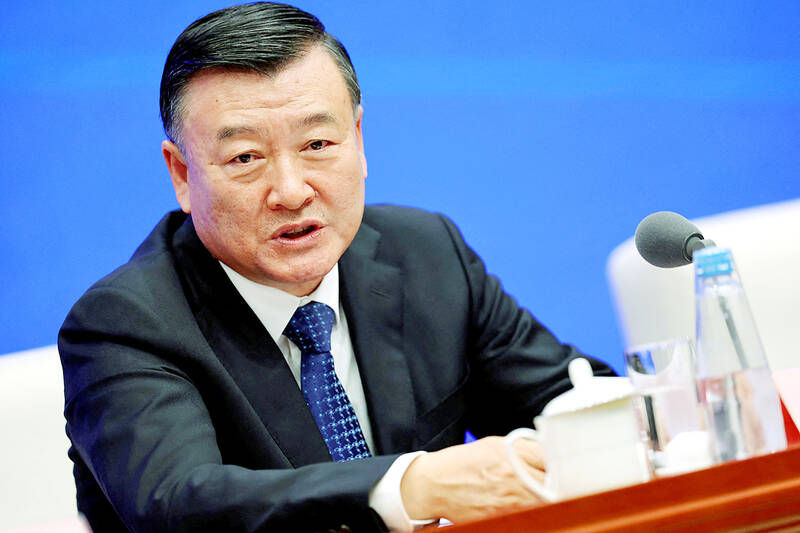China yesterday said that it would boost credit available for unfinished housing projects to more than US$500 billion as it unveiled another round of measures to shore up the sector and try to reignite the economy.
The real-estate sector has long accounted for about one-quarter of GDP and experienced dazzling growth for two decades, but a years-long housing slump has battered growth.
Chinese Minister of Housing and Urban-Rural Development Ni Hong (倪虹) at a news conference offered fresh help, saying Beijing would “increase the credit scale of white-list projects to 4 trillion” yuan (US$562 billion) by the end of the year, up from more than 2 trillion yuan.

Photo: Reuters
The “white list” scheme, announced earlier this year, pushes local authorities to recommend housing projects for financial support and work with banks to ensure their completion.
“The urban real-estate financing coordination mechanism should strive to include all eligible real-estate projects in the white list,” Ni said. “An additional 1 million worn-out homes ... will be renovated.”
The move would “be conducive to absorbing the existing stock of commercial housing,” he said.
China’s leadership last month unveiled a raft of stimulus in one of the biggest drives to boost growth for years. Among the measures were a string of interest rate cuts, the loosening of restrictions on buying homes and moves to free up cash for banks to lend more.
Beijing yesterday said it estimated that “existing mortgage rates will fall by an average of about 0.5 percentage points” under those cuts.
That would “save 150 billion yuan in interest expenditure overall, benefiting 50 million families and 150 million residents,” People’s Bank of China Deputy Governor Tao Ling (陶玲) said.
Several major cities have also eased restrictions on buying homes — most recently in Chengdu and the northern port city of Tianjin.
Stocks in Shanghai and Hong Kong slipped yesterday as traders shrugged at Beijing’s latest plan to boost the nation’s troubled property sector, which came up short of expectations.
“They’re still trying to talk the talk, with more noise about stabilizing the property market,” SPI Asset Management managing partner Stephen Innes said. “As the briefing rolled on, it was clear: traders were not thrilled.”
“Let’s be honest, though — China’s property mess isn’t something that can be patched up with a few speeches and half-baked measures,” he said.
Hong Kong’s Hang Seng Index closed down 1.0 percent at 20,079.10, while the Shanghai Composite Index was down 1.1 percent at 3,169.38.

Semiconductor business between Taiwan and the US is a “win-win” model for both sides given the high level of complementarity, the government said yesterday responding to tariff threats from US President Donald Trump. Home to the world’s largest contract chipmaker, Taiwan Semiconductor Manufacturing Co (TSMC, 台積電), Taiwan is a key link in the global technology supply chain for companies such as Apple Inc and Nvidia Corp. Trump said on Monday he plans to impose tariffs on imported chips, pharmaceuticals and steel in an effort to get the producers to make them in the US. “Taiwan and the US semiconductor and other technology industries

SMALL AND EFFICIENT: The Chinese AI app’s initial success has spurred worries in the US that its tech giants’ massive AI spending needs re-evaluation, a market strategist said Chinese artificial intelligence (AI) start-up DeepSeek’s (深度求索) eponymous AI assistant rocketed to the top of Apple Inc’s iPhone download charts, stirring doubts in Silicon Valley about the strength of the US’ technological dominance. The app’s underlying AI model is widely seen as competitive with OpenAI and Meta Platforms Inc’s latest. Its claim that it cost much less to train and develop triggered share moves across Asia’s supply chain. Chinese tech firms linked to DeepSeek, such as Iflytek Co (科大訊飛), surged yesterday, while chipmaking tool makers like Advantest Corp slumped on the potential threat to demand for Nvidia Corp’s AI accelerators. US stock

The US Federal Reserve is expected to announce a pause in rate cuts on Wednesday, as policymakers look to continue tackling inflation under close and vocal scrutiny from US President Donald Trump. The Fed cut its key lending rate by a full percentage point in the final four months of last year and indicated it would move more cautiously going forward amid an uptick in inflation away from its long-term target of 2 percent. “I think they will do nothing, and I think they should do nothing,” Federal Reserve Bank of St Louis former president Jim Bullard said. “I think the

SUBSIDIES: The nominee for commerce secretary indicated the Trump administration wants to put its stamp on the plan, but not unravel it entirely US President Donald Trump’s pick to lead the agency in charge of a US$52 billion semiconductor subsidy program declined to give it unqualified support, raising questions about the disbursement of funds to companies like Intel Corp and Taiwan Semiconductor Manufacturing Co (台積電). “I can’t say that I can honor something I haven’t read,” Howard Lutnick, Trump’s nominee for commerce secretary, said of the binding CHIPS and Science Act awards in a confirmation hearing on Wednesday. “To the extent monies have been disbursed, I would commit to rigorously enforcing documents that have been signed by those companies to make sure we get